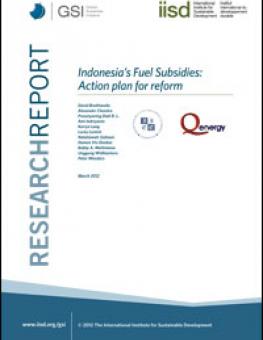
Indonesia's Fuel Subsidies: Action plan for reform
Indonesia spent IDR164.7 trillion (US$18.1 billion) subsidizing fuel products in 2011, of which IDR76.5 trillion (US$8.4 billion) was spent subsidizing gasoline.
The rising cost of subsidies is placing a huge burden on limited public resources and presents a fiscal liability, vulnerable to increases in the international price of oil. Fuel subsidies are also known to be regressive and a highly inefficient tool for reducing poverty and meeting the country's development needs.The government has made progress toward reform. It has significantly reduced kerosene subsidies with its kerosene-to-LPG conversion program. In January 2012, the government announced plans to reduce subsidies by restricting access to subsidized gasoline and developing gas-based alternative transport fuels, to be implemented by April 2012; and, as of March 2012, the government has announced a plan to raise the price of subsidized gasoline ("Premium") by IDR1,500 per litre, which is equivalent to one third of the current price.This report is an output from a project whose objective was to assist the Indonesian government to implement fossil-fuel subsidy reform and create a sustainable network to support it. The project mapped the positions of major stakeholder groups based on consultations and surveys conducted in 2011. It also provided new analysis of the practical challenges facing the government's specific implementation plans to reduce gasoline subsidies, as announced in January 2012. Finally, the action plan draws on both research and consultations to provide a set of recommended actions for progressing fuel subsidy reform.
Participating experts
You might also be interested in
How Indonesia's Incoming President Can Advance the Transition to Clean Energy
With Prabowo Subianto inaugurated as Indonesia’s President, speculation abounds about the new administration’s commitment to the clean energy transition and climate targets, given Prabowo’s positioning as the “continuity candidate.” The question is, what, exactly, will be continued?
What the war in Ukraine means for Asia's climate goals
The queues outside petrol pumps in Sri Lanka have lessened, but not the anxiety. Asanka Sampath, a 43-year-old factory clerk, is forever vigilant. He checks his phone for messages, walks past the pump, and browses social media to see if fuel has arrived. Delays could mean being left stranded for days. "I am really fed up with this," he said. His frustrations echo that of the 22-million inhabitants of the island nation, facing its worst ever economic crisis because of heavy debts, lost tourism revenue during the pandemic, and surging costs. The consequent political turmoil culminated with the formation of a new government, but recovery has been complicated by Russia's invasion of Ukraine, and the consequent upending of global energy markets.
Curbing fuel subsidies is only the first step out of energy crisis
Indonesia’s fuel subsidies have been a recurring problem for the country’s economy. For years, they have been weighing on the state budget, providing unjust support for fossil fuels and slowing the much-awaited clean energy transition. But skyrocketing global energy prices could require the country to allocate a colossal Rp 700 trillion (US$46.6 billion) for energy subsidies this year – more than four times the budgeted amount.
Switching Fossil Fuel Subsidies in Indonesia to Support a Green Recovery
This brief looks at how Indonesia can start actively promoting renewable energy by removing the existing hurdles to its deployment—such as unattractive renewable energy feed-in tariffs and land and infrastructures barriers—and switching public support from fossil fuels to renewables to meet the country’s clean energy targets.